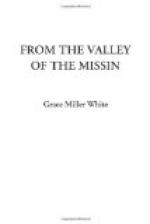“Yes.”
When Everett came in, Horace noted that he had lost the frown. Brimbecomb good naturedly demanded if Ann intended to start a kindergarten. He recounted how Mr. and Mrs. Vandecar had received their excuses, and then said:
“Ann, Mrs. Vandecar thought you so charitably inclined. She seemed quite exercised over the story. But you don’t intend to keep them here after tomorrow morning, do you?”
“Well, you see, Everett,” Ann explained, “Horace and I have talked for a long time about doing some real charity work; so now we’re going to try an experiment.”
“These boys—”
Ann interrupted. “One of them is a girl.”
Horace saw the change on Brimbecomb’s face and said hurriedly:
“The girl had on her brother’s clothes, that’s all.”
“Strange proceedings all the way through, though,” snapped Everett.
He was showing himself in a new light, and Horace noted that the young lawyer’s face bore sarcasm and unpleasant cynicism. He wondered that his gentle, obedient sister had gathered courage to stand against her lover’s wishes; for Everett had expressed a decided objection to Ann’s working for the squatter children. Suddenly he felt a twinge of dislike for the man before him, and his respect for Ann deepened. How many girls, he reasoned, would have the courage and desire thus to take in two suffering children? He rose quickly and left the room.
Everett took up the argument again with Miss Shellington:
“Ann, you’re going very much against my wishes if you keep those children here.”
“I’m sorry, Dear,” she said simply; “but you know—”
“I know that you won’t do anything of which I disapprove, Ann.”
“You’re mistaken, Everett,” Ann contradicted slowly. “I could not allow even you to mark out my duty. And something makes me so anxious to help them! I don’t want to go against your wishes; but—I must do as my conscience dictates.”
“Surely you don’t mean, Ann, that if you were my wife you would force—”
“Please don’t, Everett! No, of course not; but this is Horace’s home and mine, and, if we desire to share it with someone less fortunate than we are, you shouldn’t object.”
Everett took up no more time in vain argument; but registered a vow that he would make it warm for the beggars who had thrust themselves upon the Shellingtons. He would search for an opportunity! Impatient and unsettled, he left Ann. She, too, was unhappy; for it had been the first time her duty had ever clashed with her love. The shock of the collision hurt.
The next morning Flea crept into her brother’s room and stood looking down at him. He opened his eyes languidly, smiled, and groaned.
“Ain’t yer bones any better this mornin’?” asked Flea in an awed whisper.
“Yep; but my heart hurts me. The pains round it be worse than the misery in my knees, ’cause I can’t breathe.”




